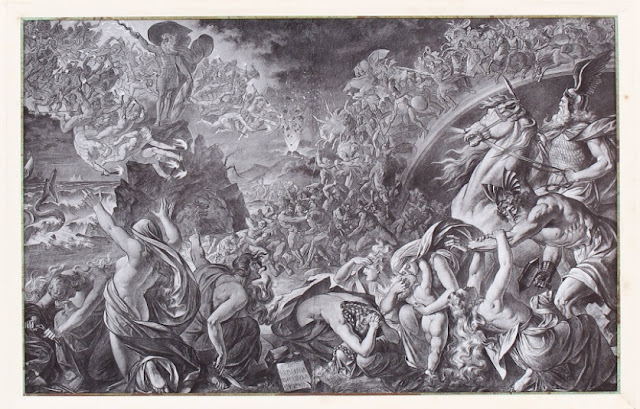This God Must Die - Working on the setting for a Cairn campaign - 01
 |
| The alchemic symbol for decomposition |
I began by thinking about a simple, dungeon-crawl oriented, campaign. I wanted to use Cairn for it, and I wanted it to be a seafaring-type of campaign. Very much like One Piece: new island, new enemies, I just needed an overarching goal to justify going to adventure. In my experience, without a goal and a narrative, campaigns made just to play do not last. I wanted this to last for a while, but with the ending in sight since the beginning. A closed experience, defined enough to be palatable for people over 30 years old (me and my friends basically), but not so railroaded to be predictable and boring.
So, the goal is to kill a god. Many religions have an end of days situation, and many pantheon have a death of the gods event. Many times, these situations are necessary for a rebirth/rejuvenation of the world. The old must die for the young to thrive. But what happens when the old one is a god? Who receives the task to carry out deicide, and why?
 |
| Carl Ehrenberg - RAGNARÖK, THE TWILIGHT OF THE GODS |
This god is part of a pantheon, and specific people are chosen to carry out its death. It has to die because it is too old and even gods should not become too old. This is a dogma, an unquestionable truth of this religion: deicide is not (always) an act of spite, rage or rebellion. It is pure and simple custom, based in this culture's philosophy around late age and drive in life. Those chosen to kill it are people who share close friendships, or that could potentially become friends quickly, for trust is needed to perform this kind of act. There is probably more, something about a particular affinity with the soon-to-die deity or its replacement to come, but I have not yet elaborated on this.
So, this god must die, but it can't do this itself, nor can other gods. Mortals need to do it, but why? The gods don't want to soil their hands with their own blood, so inferior beings have to do it, as they will perceive that blood as sacred and the task as an honor. As for motivation, that should be mysterious. Yes, the god is old, but not physically or in any other way that mortals can perceive. And the god is willing to die, for it's not the same experience as when mortals die. This should be incomprehensible to the players, as it is incomprehensible for mortals. As a GM, I don't even have to elaborate much upon this, but I surely can produce some text as mad as the 36 Lessons of Vivec.
 |
| Good luck having to deal with a Vivec-like deity, both as a player and as a GM |
Even if willing to die, killing a god is no small feat. Players will travel to different islands to retrieve something that will make the god die; to survive doing this, one of them will need to receive a temporary spark of divinity from the god itself. Obviously these islands are populated by perils of any kind: since they were sacred island, only individuals without faith and morals trespassed on their soil, seeking protection from the more pious outer world.
This seems good for now as a general concept. I'll dig deeper in later entries.
Comments
Post a Comment